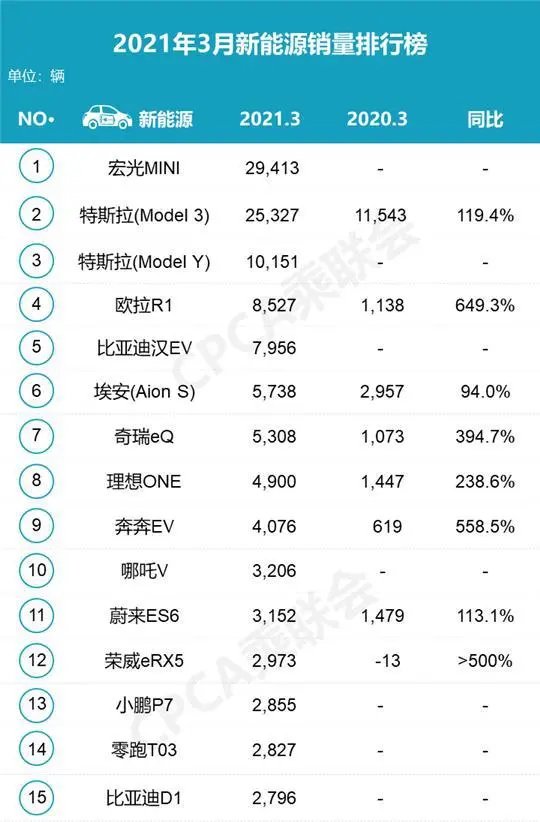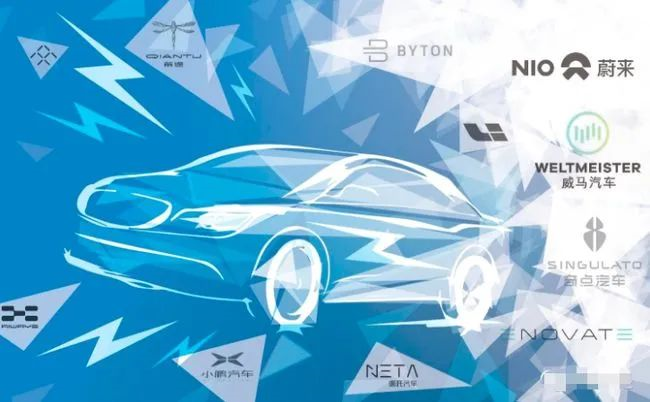Author: He Yan
Why does Huawei claim that their autonomous driving technology surpasses Tesla’s? Why did Xiaomi’s Lei Jun stake his reputation and glory on car manufacturing? Why did Apple also join the ranks of car manufacturing without hesitation?
It is because the automotive market is surging, and new forces in car manufacturing have emerged as an important and integral component of the automotive market that cannot be ignored.

According to data released by the China Passenger Car Association, in March, wholesale sales of new energy passenger cars reached 202,000 units, an increase of 101.1% month-over-month and an increase of 261.3% year-over-year, showing excellent independent growth. Among them, the wholesale sales of pure electric vehicles reached 169,000 units, a year-over-year increase of 252.2%; the sales of plug-in hybrid models reached 33,000 units, a year-over-year increase of 313.3%, accounting for 16.6%.
Meanwhile, new forces in car manufacturing, represented by NIO, XPeng, and Ideal, continue to lead the pack. Their sales in March showed an upward trend both compared with last year and the previous month.
NIO exceeds 100,000 units sold
In March, NIO delivered 7,257 new vehicles, a historic high, an increase of 373.4% year-over-year and an increase of 30.1% month-over-month. Among them, 1,529 units of NIO ES8 were delivered, 3,152 units of NIO ES6 were delivered, and 2,576 units of NIO EC6 were delivered. All three models are in hot demand, occupying part of the market share of the mid-to-high-end pure electric SUV market.
In the first quarter, NIO delivered a total of 20,060 new vehicles, exceeding 20,000 units for the first time in a single quarter, an increase of 422.7% year-over-year and an increase of 15.6% month-over-month.

In addition, on April 7th, NIO officially announced that the 100,000th NIO production car rolled off the production line at the Hefei Advanced Manufacturing Base, marking a new stage for NIO. Public data shows that from the NIO ES8, the first production car produced by NIO in May 2018, to the 50,000th production car that rolled off the production line on July 18, 2020, it took 26 months, and from 50,000 to 100,000 units, it took only 9 months.
Interestingly, after NIO announced the “100,000+” milestone, Tesla CEO Elon Musk also sent his congratulations on his personal Weibo account, saying, “This is a difficult milestone.” Obviously, NIO’s position as the leader among new forces is unparalleled, and it has the potential to surpass Tesla.In March of this year, NIO added 5 battery swap stations and 9 fast charging stations. On April 15, the first second-generation battery swap station was built within a Sinopec gas station. Currently, NIO has built a total of 201 battery swap stations, 139 fast charging stations, and 1826 destination charging piles with over 2 million battery swaps completed.
According to NIO’s founder, chairman, and CEO, William Li, NIO still adheres to the “battery swap mode” which is different from Tesla’s charging mode. The company plans to build over 500 battery swap stations and to improve the charging mode by establishing 600 supercharging stations and 15,000 destination charging piles.
In terms of product introduction, NIO’s fourth mass-produced model, the ET7, will begin delivery in the first quarter of next year. Currently, only the ES8, ES6, and EC6 models are available for sale.
Behind the frequent good news, NIO also faces an issue of chip shortage. NIO’s Hefei JAC manufacturing plant was shut down for 5 days due to the semiconductor shortage, resulting in a delay in the offline production of 500-1000 vehicles. William Li has explicitly stated that due to the chip shortage, NIO’s estimated production capacity for the first half of 2021 is around 7,500 vehicles per month.
As the first among new forces in the automotive industry, NIO needs to solve the chip shortage problem in order to continue breaking through in terms of sales.
In 2020, NIO ranked first among new forces in terms of sales, followed by Li Auto and XPeng. However, XPeng has begun to make a comeback this year.
In March of this year, XPeng delivered 5,101 vehicles, a year-on-year increase of 384%. Among them, the P7 delivered 2,855 units, an increase of 103% compared to the previous month, and the G3 delivered 2,247 units, an increase of 176% compared to the previous month. According to official statistics, XPeng’s total delivery volume in the first quarter of this year reached 13,340 units, exceeding the 12,964 units in the fourth quarter of 2020, which was the company’s highest quarterly delivery record in history, with a year-on-year growth of 487%.Compared to March 2020, which saw the delivery of 4,900 Ideal ONE vehicles, Ideal delivered 238.6% more vehicles in March 2021, and a 113% increase from February 2021, reaching a total delivery of 12,579 new cars over Q1 – a YoY increase of 334.4%, and a MoM decline of 13%.
In Q1 2021, XPeng Auto sold over 700 more vehicles than Ideal, becoming the sales runner-up among Chinese new-energy vehicle makers. However, Ideal’s high-end SUV model, Ideal ONE, is priced over CNY 300,000 and the company’s reliance on such model alone is not a durable long-term plan.
Ideal’s CEO, Li Xiang, has previously stated in an internal memo that by 2025, the company aims to claim a 20% market share in China and become the country’s leading intelligent EV maker, and by 2030, the world’s leading intelligent EV maker.
Nonetheless, with the diversification of market demands and regulatory changes, Ideal’s range-extended technology is facing major challenges. For instance, from 2023, Shanghai will no longer issue special license plates for plug-in hybrid vehicles, so it is essential for Ideal to shift its focus toward pure electric vehicles and fuel cell vehicles to solve this issue fundamentally.
Ideal is taking steps to diversify its development, acknowledging the risks at hand. Recently, Beijing Ideal Automotive Co Ltd was officially established, with registered capital of CNY 1 billion and its legal representative being Shen Yanan, co-founder and president of Ideal. The legal ownership of this subsidiary is fully held by Leading Ideal HK Limited.
The new subsidiary’s business scope includes the manufacturing of new energy intelligent vehicle systems and components, as well as providing new energy vehicle retrofitting services, mobile charging services for new energy vehicles, self-unloading new energy cargo vehicle containers, and other relevant systems.
Shen Yanan said that, as China’s charging infrastructure is still developing, Ideal will continue to follow a dual-strategy of promoting range-extending technology and pure electric technology, and the industry considers the establishment of the new subsidiary as a sign of Ideal’s new factory being in the works.
In February, NIO signed an agreement with the government of Hefei city to jointly plan the development of the New Bridge Intelligent EV Industrial Park, which aims at creating a world-class intelligent EV industrial cluster with a complete industry chain.After that, XPeng Motors also established four factories in Wuhan, Chongqing, and Guangzhou. Among them, the Wuhan factory is still in the preparatory stage. According to the plan, the XPeng Motors Wuhan Intelligent Manufacturing Base project covers an area of about 1100 mu and will build a complete vehicle and powertrain factory, with planned production capacity of 100,000 vehicles. Compared with NIO and XPeng, Ideal Motors appears to be more cautious in capacity expansion.
Among the top three new forces, NIO and XPeng have taken the lead, with multiple models enriching their product line. In contrast, Ideal Motors’ technical route is different from the first two, and it may not be able to surpass them with only a single model. In summary, Ideal Motors urgently needs to catch up with the market pace by accelerating the launch of new products.
This article is a translation by ChatGPT of a Chinese report from 42HOW. If you have any questions about it, please email bd@42how.com.